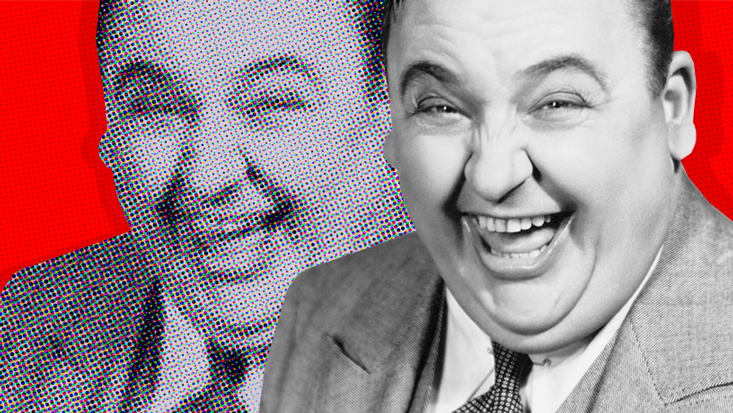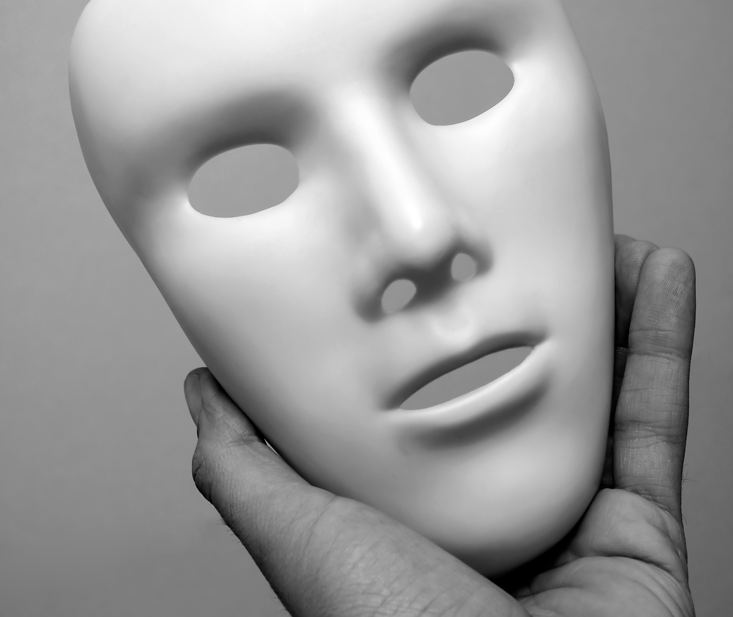Catch us if you can
We like stories about impostors because we are afraid that we ourselves belong to their number.

On a cool autumn day in 1952, the Canadian destroyer Kayuga, who was patrolling the Yellow Sea off the coast of Incheon in South Korea, brought 16 wounded soldiers aboard. They were in serious condition as a result of participation in the Korean War . Some of them would not have survived without surgery. Fortunately, the ship's doctor told the team that he was a trauma surgeon. This middle-aged middle-aged man put on a surgical gown and ordered the nurses to prepare patients. Then he went to his cabin, opened a surgery textbook and scanned it. After 20 minutes, the undergraduate student, Ferdinand Demar, aka Jefferson Baird Thorn, aka Martin Godgart, Dr. Robert Linton French, Anthony Ingolia, Ben W. Jones, and that day, Dr. Joseph Cyrus, went to the operating room.
"Scalpel!"
Taking a deep breath, the imposter surgeon cut the flesh. He kept in mind a simple principle: “The less you cut,” he said to himself, “the less he sewed then.” Having found the broken off rib, Demar removed it and removed the bullet that was next to the soldier's heart. He was afraid that the soldier would start bleeding, so he added Gelfoam, a substance that accelerates blood coagulation, into the wound, and it coagulated almost immediately. Demara put the rib back in place, darned the patient and injected a large dose of penicillin. The audience applauded.
')

Impostors professionals, such as Frank Abagnale , whose role was played by Leonardo DiCaprio in the movie “Catch Me If You Can”, are sympathetic to us because they take great risks by penetrating the romantic world, the entrance to which is closed to us.
During the day, Demar operated on all 16 soldiers. All survived. Soon the fame of the heroism of Demar hit the newspapers. The real Dr. Joseph Cyrus, who had met with Demara for a moment, read about “his” adventures in Korea, where he had never been. The military court interrogated Demara with prejudice, and then let the case go on the brakes so as not to be dishonored.
But the story went out. After about the Demara made an article in the journal Life, the pseudo-surgeon received hundreds of letters from fans. “My husband and I believe that you are sent by God,” one woman wrote to him. One sawmill in British Columbia offered him a job as a doctor. Soon a book was written about him and a film was shot, “The Great Impostor, ” where this experienced actor was played by a novice then actor Tony Curtis . Demara played the role of a doctor in the film and thought about going to medical school. But decided it was too difficult. “I have always liked shortcuts,” he said. “And it's hard to give up the habit of being an impostor.”
Impostors, these crooks with a smile and a tablet, have long existed, as an attractive legacy of deception, surprising and seducing us. And although most of us struggle to remain within the framework of society, impostors break through through them, easily entering any scene of their choice. Caught in the spotlight, they tear the covers off of professional secrets, mocking their pretentiousness. In the depths of our souls, according to psychologists, we like impostors because, in our opinion, we ourselves pretend to some extent. Their stories pull out the kaleidoscope of our “selves,” and how to cope with low self-esteem.
Psychology professor Matthew Hornsey began studying impostors after being tricked by a colleague from the University of Queensland in Australia. Elena Demidenko, who asserted about her Ukrainian roots, wrote a novel about her childhood, which received a literary award. But soon the truth was revealed: Elena Demidenko turned out to be Elena Darvil , an Australian who had nothing to do with Ukraine. Her whole story was fictional. Being deceived and betrayed, Hornsey has since been studying impostors and why people like them. “We live in a world full of obstacles,” said Hornsey. - And here you see people who take great risks, penetrating into the romantic world, the entrance to which is closed for us. This is a romantic and attractive idea. ”
Also, impostors manipulate our trust, the importance attached to us uniform, title, business card with the inscription "doctor of science." We envy the status, and we are drawn to those who love the “short cut”. We don’t want our doctor to be unreal, but we’re thrilled by the adventures of Frank Abagnayl, shown in Steven Spielberg’s film Catch Me If You Can, who traveled the world as a crook, a pretender who was running away from justice at the last moment — that's all this is even before he turned 21.
But the psychology of fraud is associated with a whole bunch of related phenomena. On the one hand - impostors like Demar and Abigneyla. On the other hand - domestic pretenders, that is, we. “Most of us do little pretending every day,” says Hornsey. - What if I smile when unhappy? What if I pretend that I wonder when this is not so? What if I pretend to be confident, but really worry? A thin line separates pretense from managing impressions and social skills. We admire the impostors, adds Hornsey, "not because we want to be like them, but because deep down we are worried that we can be them."
The need for pretense comes from a sense of danger. Sitting on the board of directors, in the classroom of the school, at a high-level meeting, you feel the shackles of fear, saying that you do not belong here. Spit on your academic degree or resume. You are not as smart as others. You are an impostor. Such self-doubt is endemic enough to deserve a name - an impostor syndrome . Psychologist Pauline Clance [Pauline Clance], who coined this term in 1978, discovered that such a syndrome often occurs in successful women, but gender-independent studies have confirmed that men are just as susceptible to this syndrome, and that about 70% of professionals sometimes feel like an impostor. .
Psychologists blame bipolar parenting styles for developing the syndrome. Endless criticism in childhood can lead to the internalization of parental contempt, which will not drown out any success. Conversely, the “ideal child” syndrome, which is praised for the simplest drawings or projects, can also turn into doubts about whether a person’s success is deserved. Regardless of the reasons, the self-proclaimed “impostor” discovers that every achievement and every compliment only reinforces the fear that someday his “pretense” will unfold.

Ferdinand Demara pretended to be a doctor, a monk, a lawyer and a teacher
The fear of pretense makes us strive for those who have no shame and doubt during the turning of the most incredible deceptions. “The people love impostors,” writes British journalist Sarah Burton in her book, Impostors: Six Types of Liars [Imposters: Six Kinds of Liar]. We are committed "openly or secretly to this kind of taboo violations." In childhood we were told that the truth must be told, Burton writes, and “when we find out that someone has had a monumental deception, our first reaction will be heightened interest.”
The young man pretends to be the son of actor Sydney Poitier , paving the way to the rich houses of Manhattan. An Austrian convinces people that, despite her ignorance of the Russian language, she is a lost Princess Anastasia from the Romanov dynasty. The cunning Frenchman again and again plays the role of a long-lost orphan. Perhaps we are attracted to impostors, says Burton, because the pretender "just can go further along the path on which we all stand."
Psychologists attribute several motives to serial cheaters, each of which is associated with one of our inner selves. Some of the impostors, says Hornsey, are “rampant adventurers” who we would like to become. Others are trying to find public support, which they lack due to shyness or alienation. Another motive is repressed self-esteem. Feeling like a loser, an impostor easily achieves a prestigious position, pretending to be the best, someone respected. Demara did not need a psychologist to understand why he was pretending to be a doctor. “No matter how you look, Dr. Robert French was a person, good or bad,” Demar wrote. “And Demar, good or bad, nobody.”
Psychologist Helen Deutsch [Helene Deutsch] believes that impostors experienced sharp turns of fate. They were raised in successful families, but their rights were suddenly violated due to divorce, bankruptcy or betrayal. They felt deceived, and they did not have time to climb the ladder of success. They restored status by simply capturing it. Frank Abagnale left the courtroom, where his divorced parents fought for custody, and began to live fantasies. He was tall, handsome, and in appearance he could have been given 26, not 16. He spent several years playing the roles of an airline pilot, guard, doctor, and lawyer. “The alter-ego of man,” he wrote in his memoirs, “is nothing but his favorite self-image.”
On a small scale, we are all pretenders, but few of us have the intelligence or social dexterity of a serial cheater. Without attending courses, Abagnale studied law books and passed the test in Louisiana. Demara could read the text on psychology one day and teach psychology the next. Serial cheaters can quickly defuse a situation with a joke, and they skillfully capture the mood of the audience. “In any organization there is always a huge amount of unused resources that can be picked up without conflicting with anyone,” said Demar, pretending to be a prison guard, professor, monk, and deputy sheriff. “Come up with your own rules and interpretations. With this, nothing compares. Remember this and penetrate the power vacuum. ”
Inside us the pretender settled a long time ago. The word "person" comes from the Etruscan "Persian", meaning "mask." Before being transformed into “persona” in Latin, this term meant characters of Greek dramas in masks. Shakespeare used this idea in his famous "the whole world - the theater", and we are just actors whose roles change with time and with circumstances.
We know our role. So why do we need a mask? Our inner pretender, according to psychologists, is powered by the struggle with our self-image. Every morning, looking in the mirror, we are disappointed with those who look back at us. We are just a shadow of what we wanted to become. How to live another day? Pretend to become a "social chameleon."
This term, according to Mark Snyder, a professor of psychology at the University of Minnesota, describes those whose inner selves are different from the public person. “In a sense, we are all social chameleons,” says Snyder, who studies personalities and social interactions. "As a chameleon who takes the color of the physical environment, we accept the social colors of our social environment, adjusting our behavior to the circumstances."

According to Snyder, social chameleons usually have strong self-control, they evaluate each new situation, how to fit into it, how to make it so that others like it. Self-control can be found in many professions, for example, in law, acting, politics. But all people with good self-control, says Snyder, would agree with the statement: “I behave quite differently with different people.”
Philosopher Daniel C. Dennett compares us with fictional characters. “We sometimes invent everything, telling and repeating to ourselves the story of our life, and not truthfully enough,” he notes. Dennett believes that our internal narrator is connected with the anatomy of the brain, and quotes neurobiologist Michael Gazzaniga [Michael Gazzaniga], who studied the components of the brain, each of which responds to its own stimuli. Components “have to work according to circumstances, and with surprising ingenuity, to get a small amount of behavioral unity at the exit,” Dennett writes. So, “all of us are virtuoso narrators who get involved in all sorts of behaviors, and we always put on the best possible masks. We are trying to combine all our data into one good story. ”
Woody Allen brought this idea to the point of absurdity in the pseudo-documentary film “ Zelig, ” in which the chameleon-man could reincarnate depending on the group of people he fell into. Leonard Zelig surprised doctors, turning into a psychiatrist in glasses, a dark-skinned jazz musician, an active Indian, and even a slugger of New York Yankees. Under hypnosis, Zelig explained why he does it: "It’s safe to be like others."
Why does it seem so dangerous to be yourself? Maybe because the inner "I" does not exist. The German philosopher Thomas Metzinger, director of the Department of Neuroethics and the MIND Group at the University. Johann Gutenberg. “There are no personalities,” writes Metzinger in the book “Being a Nobody: A Personal Model of the Theory of Subjectivity” [Being No One: The Self-Model Theory of Subjectivity]. "No one has ever had a personality, and no one was."
Metzinger believes that our mind stores only a distorted version of itself, a “phenomenological self,” seeing the world through a window, but not able to see a window. By confusing the concept of “self” with a real “self”, we are trying to achieve coherence, but as a result we accept that we act like one person on Tuesday, a slightly different version of this person on Wednesday, and God knows what awaits us by the weekend.
Metzinger says that our flimsy designs of "ourselves" are based on a central principle. “There is a fear management theory that claims that many cultural advances are just attempts to cope with the fear that appears when we are aware of our mortality,” he says. “The realization that you will die creates an overwhelming conflict in our model of self.” Sometimes I call it a cleft or a rift, a deep existential wound inflicted on us by this awareness - all my deep emotional structures say that this should not happen, and my model tells me that this should happen. ”
Our "I" is determined by our hints of mortality. She separates us from nothing. It is not surprising that we enjoy being inside our personalities. And now we have an ideal environment for this. MIT psychologist Sheri Turkle [Sherry Turkle], author of “Second Me: Computers and the Human Spirit” [The Second Self: Computers and the Human Spirit] calls the social network “identification technology”. “You can be that. You may have such friends. You may have these connections. “You can have this love, this confession, followers, people who want to be with you,” she says. “People need this connection.” And often they become online chameleons to get it.
 And for professionals of this business spotlights burn brightly as never before. As the famous New Yorker cartoon says, “nobody knows you're a dog.” Take a fictitious name, add a “Ph.D.” in a self-published book, or simply write blogs pretending to be an expert — such digital impostors thrive on the Web. You do not really believe these beautiful photos from Facebook?
And for professionals of this business spotlights burn brightly as never before. As the famous New Yorker cartoon says, “nobody knows you're a dog.” Take a fictitious name, add a “Ph.D.” in a self-published book, or simply write blogs pretending to be an expert — such digital impostors thrive on the Web. You do not really believe these beautiful photos from Facebook?Each of us is a drawing of a cubist, not having one portrait for himself. Not surprisingly, we are drawn to those who look so confident in themselves and who they are. These insidious artists offer us such self-portraits, which seem comparable in skill with Rembrandt. Ferdinand Demar. Frank Abagnale Leonard Zelig. And you? Who are you trying to fool?
Source: https://habr.com/ru/post/402921/
All Articles